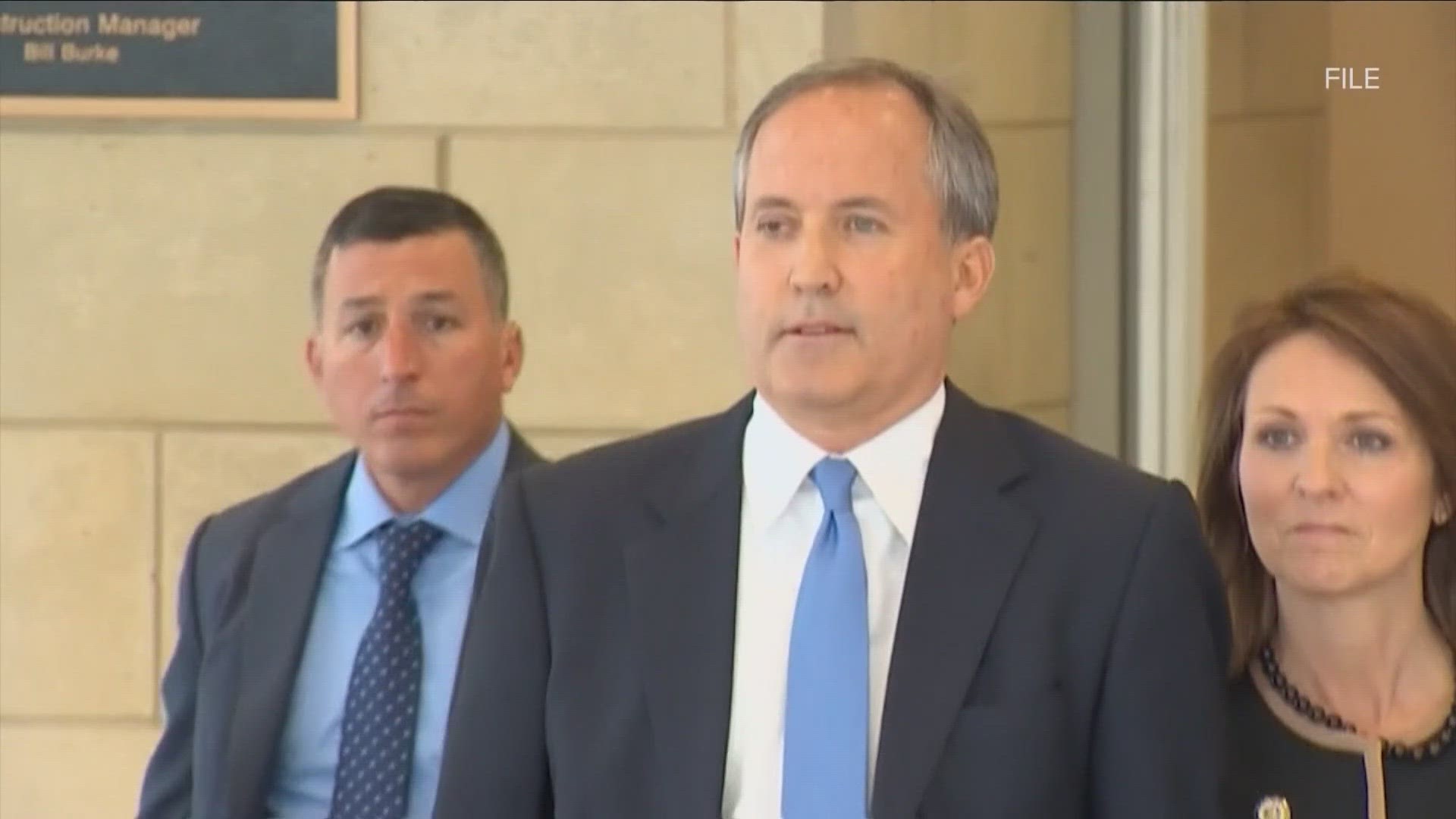HOUSTON — Prosecutors on Tuesday announced an agreement with Texas Attorney General Ken Paxton that would ultimately dismiss securities fraud charges he has been facing for nearly a decade.
Under the 18-month pre-trial agreement, the special prosecutors in the case would drop three felony counts against Paxton. As part of the deal, Paxton must pay full restitution to victims — roughly $300,000 — and must also complete 100 hours of community service and 15 hours of legal ethics education.
The resolution lets Paxton avoid a trial, which had been set to begin in less than three weeks on April 15. Paxton was first indicted in 2015 after being accused of duping investors in a tech startup near Dallas before he was elected attorney general. If he had been convicted at trial, Paxton could have been sentenced to life in prison.
What is a pretrial intervention contract?
Paxton's attorneys and prosecutors reached a deal in a pretrial intervention contract. We asked KHOU 11 legal analyst Carmen Roe exactly what that is.
"Essentially it's an informal written agreement between the defendant and the prosecutors in this case that after 18 months and perhaps even sooner, results in a total dismissal of all three felony charges," she told us.
"This was supposed to be a major blow for Ken Paxton," said KHOU 11 political analyst Brandon Rottinghaus. "These kinds of charges are oftentimes very dangerous for politicians. But he's managed to be like Teflon. Nothing sticks to him. And he effectively has been able to get out of this without even a real guilty plea."
Paxton released a statement Tuesday afternoon, thanking his family, team and supporters and saying in part, "There will never be a conviction in this case nor am I guilty."
You can read the full statement below.
The agreement with prosecutors, which lets Paxton remain in his elected position and doesn’t affect his law license, is another huge legal and political victory for one of the nation’s most visible Republican state attorney generals. The end of the case comes six months after Paxton was acquitted of corruption charges in an impeachment trial in the Texas Senate.
The resolution of the securities fraud case furthers a dramatic reversal of political fortune for Paxton, who just a year ago appeared imperiled by both the criminal case and the threat of being removed from office after his top aides reported him to the FBI.
But Paxton has emerged emboldened. He waged war against dozens of GOP lawmakers who were part of the 2023 effort to impeach him, with his biggest target being state House Speaker Dade Phelan, who was forced into a May 28 runoff. Paxton’s revenge campaign also included helping defeat three Republican judges on the state Court of Criminal Appeals because they were part of a majority that stripped his office of the power to prosecute election fraud without permission from local district attorneys. He has not ruled out a primary challenge to Republican Sen. John Cornyn in 2026.
Paxton still faces legal troubles, however. A federal investigation has been probing some of the same charges presented in his impeachment.
He is also fighting efforts by former top aides to make him testify in a whistleblower civil lawsuit that also includes allegations central to the impeachment.
The securities fraud case has hung over Paxton nearly his entire time in statewide office. Yet Paxton, 61, has shown remarkable political resilience, maintaining and growing strong support among GOP activists on the state and national level, including from former President Donald Trump.
Paxton had been accused of defrauding investors in a Dallas-area tech company called Servergy by not disclosing that he was being paid by the company to recruit them. One of the people Paxton was accused of defrauding was former state Rep. Byron Cook.
Paxton was charged with two counts of securities fraud and one count of not being registered as an investment advisor.
Paxton had also been charged in a federal civil complaint filed by the U.S. Securities and Exchange Commission over his work with Servergy. But a federal judge in March 2017 dismissed the complaint against Paxton. The person who recruited Paxton to work with Servergy, ex-company CEO William Mapp, was found liable by a jury for misleading investors and ordered to pay a civil penalty of $22,500. Mapp lost his job with Servergy and later had to work as an Uber driver to make ends meet, according to court documents.
The securities fraud case against Paxton was delayed for years during pre-trial disputes over trial location in the Dallas area or Houston, and payment for the state’s special prosecutors. The prosecutors argued most of those delays were caused by Paxton.
An attempt by Paxton’s lawyers to throw out the charges against him because the years of delay had violated his right to a speedy trial was denied by a judge last month.
The fraud allegations were among the original 20 articles of impeachment. But that process was a political one. The criminal case posed a much more serious threat.
Paxton’s political opponents, most notably Republicans, had used the fraud charges against him in elections. But Paxton has twice been re-elected as attorney general since his indictment, most recently in 2022.
Associated Press writer Jim Vertuno in Austin, Texas contributed to this report.

